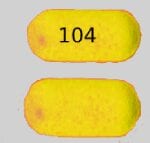Uses Of Sulfasalazine
Sulfasalazine is used to treat bowel inflammation, diarrhea (stool frequency), rectal bleeding, and abdominal pain in patients with ulcerative colitis, a condition in which the bowel is inflamed. Sulfasalazine delayed-release (Azulfidine EN-tabs) is also used to treat rheumatoid arthritis in adults and children whose disease has not responded well to other medications. Sulfasalazine is in a class of medications called anti-inflammatory drugs. It works by reducing inflammation (swelling) inside the body.
Side Effects Of Sulfasalazine
Sulfasalazine may cause side effects. Sulfasalazine causes temporary infertility in males. Fertility returns when the medicine is stopped. It can also cause your urine or skin to turn yellowish-orange; this effect is harmless.
Tell your doctor if any of these symptoms are severe or do not go away:
- diarrhea
- headache
- loss of appetite
- upset stomach
- vomiting
- stomach pain
If you have any of the following symptoms, stop taking sulfasalazine and call your doctor immediately:
- skin rash
- itching
- hives
- swelling
- sore throat
- fever
- joint or muscle aches
- pale or yellow skin
- difficulty swallowing
- tiredness
- unusual bleeding or bruising
- weakness
Warnings & Precautions
Before taking sulfasalazine:
- tell your doctor if you are allergic to sulfasalazine, sulfapyridine, aspirin, choline magnesium trisalicylate (Triosal, Trilisate), choline salicylate (Arthropan), mesalamine (Asacol, Pentasa, Rowasa), salsalate (Argesic-SA, Disalcid, Salgesic, others), sulfa drugs, trisalicylate (Tricosal, Trilisate), or any other drugs.
- tell your doctor and pharmacist what prescription and nonprescription medications you are taking, especially digoxin (Lanoxin), folic acid, and vitamins.
- tell your doctor if you have or have ever had asthma, kidney or liver disease, porphyria, blood problems, or blockage in your intestine or urinary tract.
- tell your doctor if you are pregnant, plan to become pregnant, or are breast-feeding. If you become pregnant while taking sulfasalazine, call your doctor.
- plan to avoid unnecessary or prolonged exposure to sunlight and to wear protective clothing, sunglasses, and sunscreen. Sulfasalazine may make your skin sensitive to sunlight.
Dosage
Sulfasalazine comes as regular and delayed-release (releases the medication in the intestine to prevent irritation to the stomach and to allow the medication to work in the intestine where its effects are needed) tablets. It usually is taken four times a day in evenly spaced doses throughout the day so that no more than 8 hours separates any two doses, if possible. Take sulfasalazine after a meal or with a light snack, then drink a full glass of water. Follow the directions on your prescription label carefully, and ask your doctor or pharmacist to explain any part you do not understand. Take sulfasalazine exactly as directed. Do not take more or less of it or take it more often than prescribed by your doctor.
Swallow tablets whole; do not crush or chew them.
Drink plenty of fluids (at least six to eight glasses of water or other beverage per day) while taking sulfasalazine.
Continue to take sulfasalazine even if you feel well. Do not stop taking sulfasalazine without talking to your doctor.
Other
Keep all appointments with your doctor and the laboratory. Your doctor may order certain lab tests to check your response to sulfasalazine.
Do not let anyone else take your medicine. Ask your pharmacist any questions you have about refilling your prescription.
It is important for you to keep a written list of all of the prescription and nonprescription (over-the-counter) medicines you are taking, as well as any products such as vitamins, minerals, or other dietary supplements. You should bring this list with you each time you visit a doctor or if you are admitted to a hospital. It is also important information to carry with you in case of emergencies.
Source
All information has been provided courtesy of MedLinePlus from the National Library of Medicine and from the FDA.



